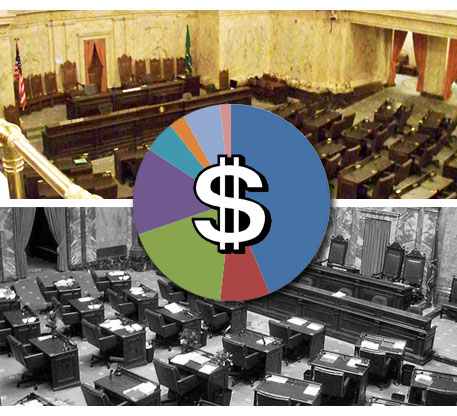STATE GOVERNMENT
Attend town hall meetings, urge support for pro-worker bills
Tell your elected officials to pass a budget that funds public employee contracts, advances other working family priorities
OLYMPIA (March 9, 2023) — Today is Day 60 of the 2023 Washington state legislative session, which is scheduled to conclude on its 105th day, April 23. After Wednesday’s cutoff deadline for bills to pass their houses of origin, many Washington state legislators are returning to their legislative districts in the next few weekends to hold Town Hall meetings — some in-person, some via phone or Zoom — to update constituents on the session and answer questions.

Multiple important pro-worker bills supported by the Washington State Labor Council, AFL-CIO and its affiliated unions remain alive. (Check our latest status report on the WSLC’s “Better Jobs, Stronger Communities” agenda, updated after Wednesday’s cutoff.) So these upcoming Town Hall meetings are a perfect opportunity to ask your representatives and senators to support Washington’s working families by supporting these bills.
TAKE A STAND — Check the following links for schedules of Town Hall meetings and mark your calendars to attend:
House Democrats
House Republicans
Senate Democrats
Senate Republicans (no schedule posted, so contact your senator directly)
 In addition to the policy bills listed in our latest status report, make sure you urge your elected officials to honor collective bargaining and statutory pay requirements in the biennial budget by funding the contracts and healthcare agreements for state employees, teachers, and other educational staff who kept our state going throughout the pandemic.
In addition to the policy bills listed in our latest status report, make sure you urge your elected officials to honor collective bargaining and statutory pay requirements in the biennial budget by funding the contracts and healthcare agreements for state employees, teachers, and other educational staff who kept our state going throughout the pandemic.
Some examples of other opportunities to support working families in the budget include:
● Improving pay equity at Washington’s community and technical colleges (CTCs) where part-time faculty are sometimes paid as little as 52% of what full-time staff earn for teaching the same class with the same qualifications.
● Improving nurse educators’ compensation at 4-year universities, building on progress made at CTCs;
● Promote affordable child care for working families by adopting rate enhancement for providing non-standard hours of care at Early Achievers facilities and by promoting construction job-site proximate childcare facilities;
● Ensuring that school districts’ contracted bus drivers, who provide the same exact services as district-employed bus drivers, have comparable healthcare benefits; and
● Promoting family-wage careers by:
○ Continuing $2 million annual aviation workforce and apprenticeship investments;
○ Matching private investments in union Meat Cutting and Fishmonger apprenticeships;
○ Increasing funding for the Job Skills Program so that more employers can seek matching funds to modernize incumbent worker training; and
○ Expanding maritime training programs to more CTCs outside of Seattle.
The capital budget also presents opportunities to support workers and create good jobs, such as modernizing our schools and performing climate upgrades to reduce energy consumption.
And how do you pay for these pro-worker fiscal priorities? You take steps to fix Washington’s most regressive, upside-down, and backward tax system in the country. Low-and-middle income families pay far more of their income in taxes so the wealthiest can avoid paying their fair share to support our schools, safety net programs, and public safety.
The WSLC and the labor community supports revenue options that secure high-quality public services and jobs, but that do not fall on working families. Further, when tax preferences are considered, they should be tied to strict labor standards which promote the highest quality and number of jobs practicable.





